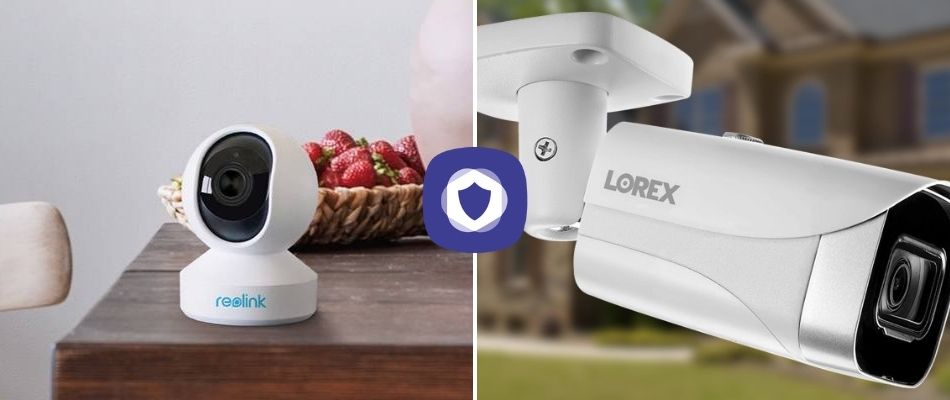If you’re looking to increase your home security, it’s no surprise if this isn’t the first time you’ve heard these names.
Launched in 2009, Reolink’s primary focus is delivering high-quality cameras at a reasonable price. Reolink promises to make your home and office more secure.
Lorex is a Canadian-based company that focuses on providing security cameras for homes and businesses. Both companies have a lot to offer, and today we’re going to look at the differences and similarities between them to assist you in choosing the best camera system.
Lorex and Reolink – what do they have in common?
Both offer a simple, easy-to-install home security setup without the need for any commitments or subscriptions, neither can be monitored by a third party but mobile apps and other features make it easy for you to monitor your home security by yourself. Here are a few key features that they both have in common.
- Weatherproofing: Both offer cameras with weatherproofing, a must for an outdoor security camera.
- Motion Detection: Both systems encompass motion sensors that will alert you whenever triggered. You can do this via push notifications no matter where you are.
- Mobile App: The Reolink Argus Eco can alert you to motion via email, push notifications, or the Reolink App. The Lorex app will allow you to use two-way communication and pan, tilt or zoom features.
- Camera Quality: Both security camera systems offer good video quality, with 1080p image quality being provided by both, meaning that you can clearly make out necessary details in video footage taken by either camera.
- Communication: Several models offer two-way audio communication for your convenience. This lets you tell a delivery driver where you want your parcels left or let a friend know when you’ll be home.
Reolink vs. Lorex – What are the differences?
Despite the apparent similarities between the two systems, there are key differences to consider.
- Smart Home Integration: Neither is particularly impressive in this area, but Lorex offers much more comprehensive smart home options.
- Environmentally friendly: Some Reolink models can have their batteries charged via solar panel, an option that Lorex doesn’t presently offer.
- Night Vision: Reolink’s cameras offer night vision, and some even provide color night vision, making this an ideal security system if you need after-hours coverage. Reolink’s night vision covers up to 30m compared to Lorex’s 27m. Reolink offers both Starlight and Infrared LED night vision compared to Lorex, which just offers Infrared LED night vision.
- Lorex 4k: offering ultra HD sets Lorex Cameras apart from the rest of the industry; though not all models have this feature, the more advanced ones do, and it is certainly worth taking note of if you want camera quality is not just good, but exceptional.
- Viewing Angle: Lorex offers a wide 88° viewing angle, but Reolink tops this by providing a 100° viewing angle.
- Cloud Storage: Reolink offers a level of cloud storage, whereas Lorex does not. Lorex IP cameras connect to NVR, and MPX cameras use a DVR. Wireless cameras provide SD card recording options – there are no cloud storage options.
Lorex – What you need to know
Installation
All Lorex cameras are designed for DIY installation, with the company promising that setup is simple irrespective of the camera you purchase.
Though installation time and difficulty can vary (because there are wired, Wifi, and power over ethernet options), each will come equipped with a detailed installation manual and requires only basic tools such as drills and screwdrivers to complete installation.
As you’d anticipate, wire-free installation is the fastest to complete and takes just a few minutes.
Home Automation
While Lorex doesn’t have the most advanced automation options on the market, it is more developed than Reolink in this area encompassing Alexa, Google Assistant, Apple TV, and IFTTT compatibility, which allows you to stream video using Apple TV or other smart assistants.
With that said, Lorex doesn’t offer any of its home automation software, making it challenging to design a comprehensive smart system using only Lorex.
Costs
Owing to the multiple bundles and models to choose from, the price can vary considerably. You can choose to purchase standalone cameras or up to 32 cameras in one bundle. Prices range from $99 to $9000+.
Nerd Pros
- Customized motion detection: Users can set up customized activity zones to prevent unwanted alerts for unnecessary things like a car driving past or an animal wandering into your yard. You can also choose to alter your camera’s motion detection sensitivity.
- Multiple options: Lorex offers many great products. Whether you’re trying to secure a business or family home, there’ll be a Lorex camera to meet your security needs, including ethernet cable or wireless options, HD video, and more. All security needs are catered to, from CCTV cameras to baby monitors.
- Field of view: Whether you want a standard field of view or a 360-degree view, you can choose from a wide variety of models based on what you want to see.
Nerd Cons
- Initial Outlay: Since the cost cannot be spread out via a subscription payment, the outlay is higher than some competitors. While the price isn’t outrageous, it is noticeably higher.
- Lack of home integration options: While Lorex does beat Reolink in this category, Lorex cameras still don’t have much to offer if you want a smart home system.
Reolink – What you need to know
Installation
Depending on the Reolink camera you choose, installation can be as simple as using a QR code. However, some cameras will need mounting, but users report an easy process without the need for professional installation. Because these battery-powered cameras are wire-free, there’s no need to worry about messy installation.
Home Automation
Reolink falls behind most competitors, including Lorex, in this area. Most of the cameras are compatible only with Google assistant and no other third-party home automation tools. Alexa compatibility is in the pipeline, according to the company.
Pricing
Like Lorex, Reolink’s prices vary considerably, with costs beginning at around $70 for a single Wifi camera. Unlike Lorex, Reolink also offers cloud subscription services at the below prices.
- Basic plan: $0/month; 7 days of video, 1 camera; 1 GB cloud storage
- Standard plan: $3.49/month, 30-day cloud storage, five cameras, 10 GB cloud storage
- Premier plan: $6.99/month, 30-day cloud video history, ten cameras, 40 GB cloud storage
- Business plan: $10.49/month, 60-day cloud video history, 30 cameras, 100 GB cloud storage
Nerd Pros
- Simple Installation: Most installations have only one step, but even the slightly more complex variations require only a simple mount.
- Pricing: If you’re looking for a Reolink camera, chances are you’ll end up spending under $100 procuring a camera from this budget-friendly brand.
- Power Options: Multiple power options are offered, including solar-powered batteries.
Nerd Cons
- Lack of smart home options: Compared to competitors including Lorex, Reolink doesn’t really have much to offer in terms of home integration. Some of the cameras work with google assistant, but that’s the limit of its integrative capabilities.
- Limited general capabilities: Our SecurityNerd was disappointed with the lack of features like geofencing and person detection. Other cameras in a similar price point have more features than what Reolink offers.
Lorex or Reolink?
When it comes to choosing between home security cameras, there are lots of features to take into consideration.
If the image quality is of paramount importance to you, then you’d want to look at Lorex, as their cameras support 4K image quality. Lorex also wins in home automation, boasting a much larger cache of integrations than its competitor.
However, with many options under $100, Reolink is probably an ideal provider for the budget-conscious.
Shop Lorex Cameras Shop Reolink @ Amazon
This article has been reviewed and approved by Officer Banta.

Officer Banta is the official SecurityNerd home security and safety expert. A member of the Biloxi Police Department for over 24 years, Officer Banta reviews all articles before lending his stamp of approval. Click here for more information on Officer Banta and the rest of our team.

